hankyoreh
Links to other country sites 다른 나라 사이트 링크
[Interview] “What is genocide if this is not genocide?”: Palestinian scholar on war in Gaza
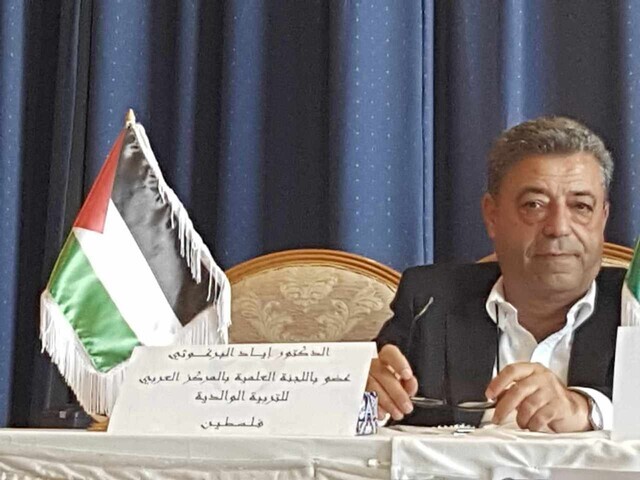
Israel’s attacks on the Gaza Strip have continued for nearly 40 days. Bombs have been raining on the region’s hospitals, schools and refugee villages.
But while the world has been focusing its attention on the war between Israel and Hamas, the voices of the actual Palestinians who are being affected are not truly being heard.
Iyad Barghouti, a scholar and human rights activist in the occupied West Bank city of Ramallah, shed some light on what Palestinians themselves think of the current situation and his predictions for the future.
Barghouti criticized the “double standard” that Western countries have been applying to Palestine and Ukraine, stressing that the world needs to confront issues concerning the occupying presence of Israel and the occupied Palestinians.
Even if Israel succeeds in wiping out Hamas and reoccupying Gaza, it will face stiffer resistance before long, he predicted. The only solution, he said, lies in guaranteeing the rights to land and freedom to the Palestinians who have been living under occupation.
He also expressed his hope that growing sympathies with Palestinians’ suffering in South Korea and around the world could lay the foundations for change.
Despite the severe situation in Israel, where the Knesset has passed legislation punishing critical speech, Barghouti summoned the courage to raise awareness of the situation confronting Palestine. In addition to taking part in a Zoom interview on Nov. 8, he also participated in subsequent conversations.
Barghouti is the chairperson of the Arab Network for Tolerance, an NGO working toward mutual understanding and respect for minorities. He has also served as a professor at Palestine’s Birzeit University and director of the Ramallah Center for Human Rights Studies. His books include “The Palestinian Islamic Movement and the New World Order” and “Islamization in the Occupied Territories.”
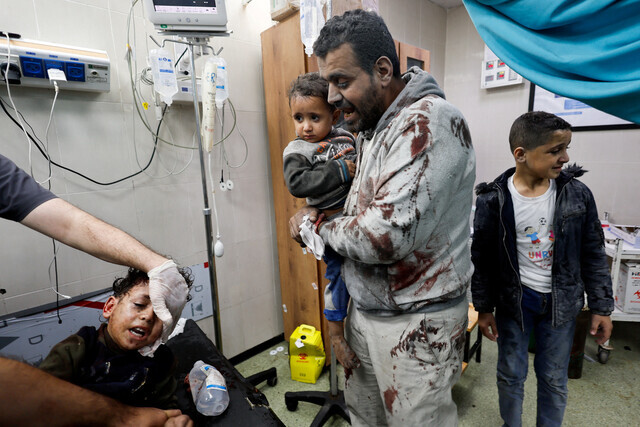
Iyad Barghouti: A real crime is ongoing in Gaza. You’re talking about 11,000 people who were killed in a month — about 4,000 or 5,000 children. I stopped watching TV because you cannot see these things. You need exceptional courage to even watch. You can imagine how they feel there without food, without water, without electricity and with this bombing every minute, every second. They bombed hospitals, schools. A week ago, I talked with my friend in Gaza. They moved from their home in Gaza to a school in Gaza for the UNRWA [United Nations Relief and Works Agency]. It’s the UN, so that’s why they felt it was safer, but it seems that it is not. They [Israel] even bombed some schools. I hear that about 1 million have left for southern Gaza, but many of those people who left to the south were bombed during their journey south.
Gaza is a very dense city. There are a lot of people in a small area, and extended families are living together in the same house. When you look at the names of those who were killed by the Israelis, you see every day 20, 30, 40 people from the same family. Sometimes the father, the mother, the grandfather, the grandmother, the brothers, the sisters, will all die and you have just one 2-month-old child left alive [in a family]. How can you even imagine what’s being perpetrated by the Israelis?
If you take what happened in Ukraine, Putin took about 50,000 [Ukrainian] children to Moscow. The International Criminal Court accused him of a war crime. Yet Netanyahu is still considered a normal person after killing all these people and children. It’s a double standard that the West uses when looking at the problems.
Hankyoreh: Do you feel the international community is doing nothing to address this situation?Barghouti: They aren’t doing “nothing.” I wish they were only doing nothing. Instead, they are helping the killer. Biden came, the British prime minister — all of them came here to support this “holy Israel.” International politicians are asking for a ceasefire, but the Americans say, “No. It’s not logical to ask for a ceasefire” — so what, is the logic to continue killing people? What is the logic?
We are under occupation. We have the right to defend ourselves. Americans and Biden say that Israel has a right to defend itself by law. But the occupier has not the right to defend himself. Those who are under occupation should defend themselves.
Hankyoreh: Israel has been warning Gazans to leave the northern region and flee south.
Barghouti: About 80% of the people in Gaza are refugees, people who were made refugees when Israel took Palestinian territory [in 1948] during the Nakba. Most of the area Hamas attacked on Oct. 7 are the former villages, sometimes former homes [of Gazans]. I think the people of Gaza don’t want to leave because of the experience in ’48. The Arab regimes told the Palestinians that if they leave their homes for a week or two, they will arrange a peace situation and be allowed to return. They’ve been waiting for that for 70 years. So they don’t believe what the media and the Americans tell them — that this is just to arrange things, or to get rid of Hamas. People don’t want to leave. It’s as simple as that.
This transfer, especially for Palestinians, means a lot. It means losing your home, your family, your memories, your everything. That’s why the Palestinian problem is mostly related to the “right of return” of Palestinians to their homeland. Most of the time we don’t talk about the state, about the political regime, about what kind of state we need. We talk about our right to go to our homes.
I hear that about 1 million left to the south of Gaza [following warnings from Israel]. They bombed the cars and buses, and many were killed while moving. I think that it [Israel pushing Gazans south] is for two reasons. One, for military reasons: they want the north to be empty so they can do whatever they like — bombing and attacking. And the second thing is to be closer to Egypt so that if the opportunity arises, they might push [Gazans] toward Sinai.
Hankyoreh: Do you think that Egypt will take in Gazans?Barghouti: Egypt feels that this goes against their safety or the situation inside Egypt. Since the 1973 war, the peace agreement between Israel and Egypt is in a weak place, and the Egyptian army is small, and there are many problems in Sinai. So [fleeing Gazans] will add another problem, so [Egypt] may refuse. But the Egyptian regime has many economic problems and is weak, Americans might put pressure on it to accept [Gazans]. This is a very big problem for the Gazan people, because if they leave Gaza, they cannot go back.
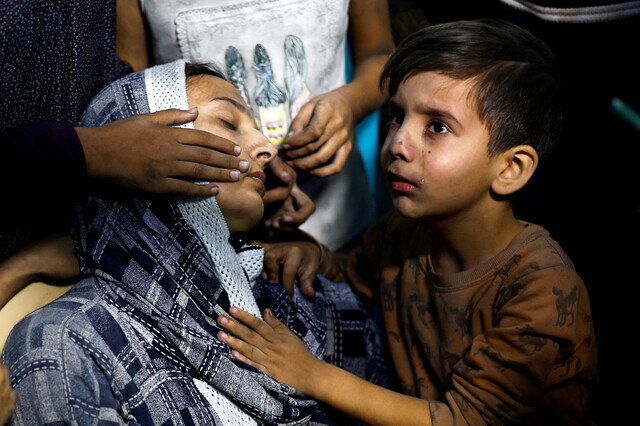
Barghouti: It is completely genocide. You’re talking about 11,000 killed and about 40,000 injured in these circumstances. There is no medicine, no hospitals. Hospitals are stopped. We still don’t know how many people are under the rubble of houses. What is genocide if this is not genocide? Israel says they are fighting “human monsters.” This is what Gallant, the minister of defense of Israel, said: That Palestinians are not humans. They are “human monsters,” so they have to fight them.
Hankyoreh: How does hearing that make you feel?Barghouti: For me, it is not strange. Yesterday [Nov. 7] a minister in the Israeli government said that they should bomb Gaza with an atomic bomb. If you read, Zionism is racism — they are saying they established the state [of Israel] on something from the Bible that says they are the promised people, they are exceptional, they are different, so they should take this holy land.
Hankyoreh: All throughout Israel’s invasion of Gaza, the situation in the West Bank is deteriorating as well. How serious are things there?Barghouti: We have about 8,000 people in the West Bank who are in jail. During this war, [Israel] arrested in the West Bank — not in Gaza — about 3,000 people and tortured them. Three people were killed [in prison]. The West Bank is more important than Gaza for the Israelis because their narrative about the Bible, about God and whatever is in the West Bank, not Gaza. West Bank means Jerusalem, the West Bank means Hebron — these cities which they claim are Jewish cities. We have in the West Bank about 1 million settlers who built 700 or so settlements here. Every [Palestinian] city and every village is closed. They made gates for every city, and they closed them. We are in prison. Now, I cannot go outside Ramallah. You can only walk through the mountains, you cannot go by car. There are about 450 checkpoints on the roads. If you go, the army will arrest you. Sometimes the settlers will kill you.
Hankyoreh: Are you afraid that if Israeli troops occupy Gaza, maybe they will expand their settlements or take more land in the West Bank?Barghouti: We have the problem of Israel and how they think of Israel and its strategy to expand in the area. And we have the personal problem of Netanyahu, who thinks that when the war ends, he will go to prison or to court. So he wants the war to go on as long as he can so that during the war they can do everything.
Hankyoreh: Do you think there’s a possibility of a third intifada?Barghouti:A classic intifada would be difficult. We have demonstrations every day [in the West Bank], we have some clashes with the army in places like Jenin and Nablus. The Palestinian Authority is cooperating with the Israelis to keep the situation quiet, but the situation is very difficult and clashes with Israelis are occurring every day. Since Oct. 7, 160 people have been killed in the West Bank, 2,000 injured, and 3,000 arrested. This didn’t happen even during the intifadas. So it’s kind of an intifada already.
Hankyoreh: Do you think Israel can completely eradicate Hamas in Gaza?Barghouti: Not easily. Hamas is a movement with an Islamic religious ideology. They are in Gaza, in the West Bank, abroad outside of Palestine. Many of them, thousands, are in jail in Israel. So it’s not easy. Even if they become weak, after a few years, they will return.
Hankyoreh: How do you view Hamas’ attacks on Israeli civilians on Oct. 7?Barghouti: What happened on Oct. 7 is still vague. Hamas had four Israeli soldiers they wanted to exchange for Palestinian prisoners. The Israeli government refused. So Hamas said they would capture more Israelis. But when they made their attack, they discovered that things were much easier than they imagined. They took about 300 Israelis, most of them soldiers, and some ordinary people. They went to arrest, to retrieve people to negotiate with for the Palestinian prisoners, not to kill them.
Hankyoreh: Isn’t it a serious problem that Hamas brutally killed many Israeli civilians?Barghouti: After the first stage of the fight that day, many irresponsible people, many civilians entered, and we don’t know exactly what happened. Some have said that many of the civilians were killed by the Israeli military, but those who talk about this stopped because the Israelis are preventing anybody from talking about this issue. Since 2006, after the problem of [Gilad] Shalit, the French Israeli soldier, they have a rule called the “Hannibal rule” where it is better to kill an Israeli captured by the enemy because the enemy will use them for negotiation, so they kill both [the captor and captive].
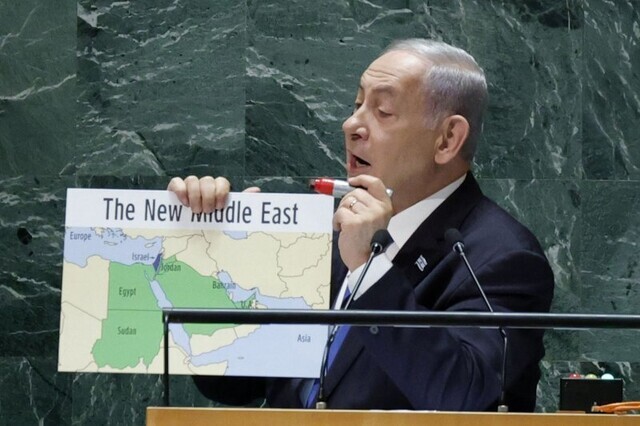
Barghouti: The Israelis dream of Iran every minute of their life. If a bus were to get into an accident in Haifa, they would tell you that Iran might be behind it. I don’t think so. Hezbollah said that they didn’t have any idea about the Hamas attack. I doubt that Iran wants to make this issue. Many people are trying to say that this is Iran because they want the problem here to be not between Israel, which occupies Palestinian land, and Palestinians under occupation, but to say that this is “religious differences” between the Sunni and Shia, which is not true.
Hankyoreh: What kind of role will Hezbollah play in the current conflict?Barghouti: Hezbollah is supporting Hamas with limited clashes on the borders, but I doubt they will go to war as we imagine it. It’s not their fight. They know the situation in Lebanon, they know that the American army is not far from them in the Mediterranean. They know that the West wants war to look as if it’s Iran against Arabs, Sunni against Shia.
Hankyoreh: Netanyahu has put forward a plan that after pushing out Hamas, Israel will control Gaza. Do you think this will be the case?Barghouti: Israel used to occupy Gaza twice. Once in 1956, when Egypt was there, and again in ’67. They left Gaza because of the [Gazan] people’s resistance. If they come back to Gaza, in one or two years there will be a resistance and they will leave. The solution for the whole problem is to stop the occupation and behave as a normal state and find something in common with your neighbors.
Hankyoreh: What do you make of Israel’s plan to divide Gaza into north and south and control the north as a supposed “buffer zone”?Barghouti: Everything is possible for some time, but nothing is possible for forever. We have 14 million Palestinians and a little less than 14 million Jews in the world, not just Israel. We need to find a logical, just solution to the problem. Israel came to an area, took the land of another people. [Imperial states] invented Israel for imperial reasons, not for anything else. But after seeing how weak it is, Israel has lost its function for imperialism. They wanted Israel to be the safest place in the world for Jews. Now, it is not safe at all for Jews or non-Jews. If [Israel] wants to live in peace with others, it should find some kind of just solution. The fair thing is to grant Palestinian people the right to return to their homes.
Hankyoreh: When Netanyahu showed his “new Middle East plan” map to the UN General Assembly in September, Palestine was nowhere to be seen. Do you see this as an indication of plans to expel Palestinians even before Oct. 7?Barghouti: Their plan is to expel us out of Palestine for a Jewish state. There is no West Bank, there is no Gaza, everything is Israel. At the last G20 conference, Israel and the Americans talked about the road from India to Europe. Many politicians talk about the war as unrelated to the internal relations between Palestinians and Israelis. They want to make a path south of Israel and Jordan to the Mediterranean, which would go through Gaza or near Gaza. So they want to not have Palestinians there. The real problem is to have this [economic road] from India through Saudi Arabia. That’s why they normalized ties between Saudi Arabia and Israel.
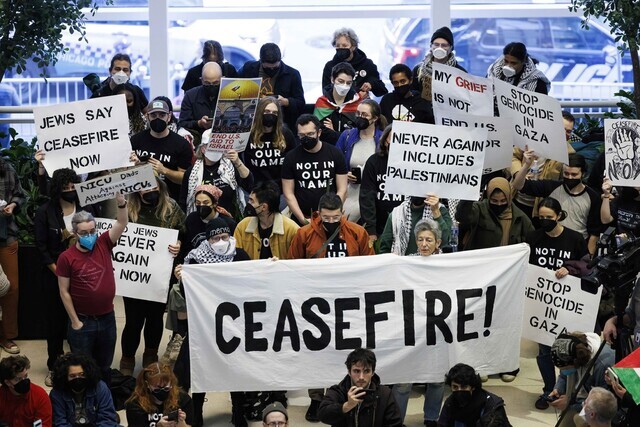
Barghouti: Yes, sure. They want Gaza to be empty of Palestinians, but I think that is not possible. Palestinian people will stay. It may be possible for some time, but not for the long run.
Hankyoreh: Do you think that the normalization process between Saudi Arabia and Israel will continue after this?Barghouti: Now, it has become more difficult. But I think it will continue, because the Americans have a big influence on Saudi Arabia and want it to be closer to Israel. The Saudis are now talking about common projects with Israel, like building the huge Neom city near Israel. The area of Saudi Arabia is like a continent, yet they want the corner near Israel to build that city.
Hankyoreh: Outside observers, including some Koreans, mistakenly believed that the two-state solution of the early 1990s, including the Oslo Accords, had improved the Palestinian situation. Why has the situation worsened since then?Barghouti:The Palestinians lost their land in 1948 and they accepted [in the Oslo Accords] to take the 22% that remained. Even after the Oslo agreement, the Israelis refused to give them any type of state. They are racists. They don’t see others, since others are “monsters.” Why divide the land with “monsters”? “Monsters” cannot do anything with the land. The Oslo Accords, from my point of view, was a crime against Palestinian rights. What happened in Oslo is that we recognized that 78% of Palestine is for Israelis and they recognized the PLO [Palestine Liberation Organization] as the representative of Palestinians. They didn’t say 78% [of the land] for Israelis, 22% for Palestinians. They talked about 78% for Israelis, and PLO as representative for Palestinians. It’s not logical. It’s like if we had $100 and you say that 80% is for you and you say, “You’re a nice guy” to me.
Hankyoreh: Biden and other leaders like Xi have brought up the two-state solution again. Do you think there will be any progress toward such a solution?Barghouti: Biden is a complete liar. Since 1947, UN resolutions have talked about two states in Palestine: one for Israelis, and the other for Palestinians. They have talked many times about the necessity of a two-state solution. We already have one state [Israel], so why don’t we have the other? Who prevented this? A two-state solution is not possible. If you come to the West Bank, you’ll see that it’s like chess — you have a Palestinian village and around it, you have four Jewish settlements. So it’s not possible to have a state in the West Bank.
What kind of solution do we need? In my opinion, we have to talk about the problem that took place in ’48. There was no Israel, there were many Jews who lived among Palestinians with no problems. If we have the right to return to our land, maybe you can call it one state. I think the political regime is not a problem if you have the right to your land, to move, your liberty. Throughout history, there were no problems between Jews and Arabs in the area.
Hankyoreh: Do you think coexistence between Palestinian and Jewish people is possible?
Barghouti: It is possible. Yes.
Hankyoreh: There have been protests and rallies across the globe condemning the attacks on civilians in Gaza and voicing sympathy with the plight of Palestinians. Do you think this sort of public opinion will have real repercussions?
Barghouti: There is a change, even among Western people. There have been huge demonstrations in Washington, London and Paris. I think change takes time, but it’s good that people are discovering what Israel is. Israel is a criminal state. They are crying about the problems of Jews throughout history, about the Holocaust, yet those who were victims of the Holocaust are criminals now. Imagine that for 100 years this small, poor people is fighting and resisting the international movement of Zionism — the richest movement in the world, the most dangerous movement in the world. It is a real support when we hear that somebody at the other end of the world is supporting us or even understanding [our situation]. Because sometimes we feel that the world doesn’t understand our problem. We are under the shoes of the Israelis, and people are supporting Israel. I am happy that we have people like you.
Hankyoreh: So you feel that the world is better aware of this situation and that going forward there will be better solutions for Palestinians?
Barghouti: I hope so. In the long run, yes. I think the process of regaining our rights has started.
By Park Min-hee, editorial writer
Please direct questions or comments to [english@hani.co.kr]

Editorial・opinion
![[Column] When ‘fairness’ means hate and violence [Column] When ‘fairness’ means hate and violence](https://flexible.img.hani.co.kr/flexible/normal/500/300/imgdb/original/2024/0516/7417158465908824.jpg) [Column] When ‘fairness’ means hate and violence
[Column] When ‘fairness’ means hate and violence![[Editorial] Yoon must stop abusing authority to shield himself from investigation [Editorial] Yoon must stop abusing authority to shield himself from investigation](https://flexible.img.hani.co.kr/flexible/normal/500/300/imgdb/original/2024/0516/4417158464854198.jpg) [Editorial] Yoon must stop abusing authority to shield himself from investigation
[Editorial] Yoon must stop abusing authority to shield himself from investigation- [Column] US troop withdrawal from Korea could be the Acheson Line all over
- [Column] How to win back readers who’ve turned to YouTube for news
- [Column] Welcome to the president’s pity party
- [Editorial] Korea must respond firmly to Japan’s attempt to usurp Line
- [Editorial] Transfers of prosecutors investigating Korea’s first lady send chilling message
- [Column] Will Seoul’s ties with Moscow really recover on their own?
- [Column] Samsung’s ‘lost decade’ and Lee Jae-yong’s mismatched chopsticks
- [Correspondent’s column] The real reason the US is worried about Chinese ‘overcapacity’
Most viewed articles
- 1Could Korea’s Naver lose control of Line to Japan?
- 2[Column] Welcome to the president’s pity party
- 3[Column] US troop withdrawal from Korea could be the Acheson Line all over
- 4Naver’s union calls for action from government over possible Japanese buyout of Line
- 5[Editorial] Korea must respond firmly to Japan’s attempt to usurp Line
- 6Korea cedes No. 1 spot in overall shipbuilding competitiveness to China
- 7[Editorial] Yoon must stop abusing authority to shield himself from investigation
- 8[Column] When ‘fairness’ means hate and violence
- 9Korean opposition decries Line affair as price of Yoon’s ‘degrading’ diplomacy toward Japan
- 10Second suspect nabbed for gruesome murder of Korean in Thailand, 1 remains at large